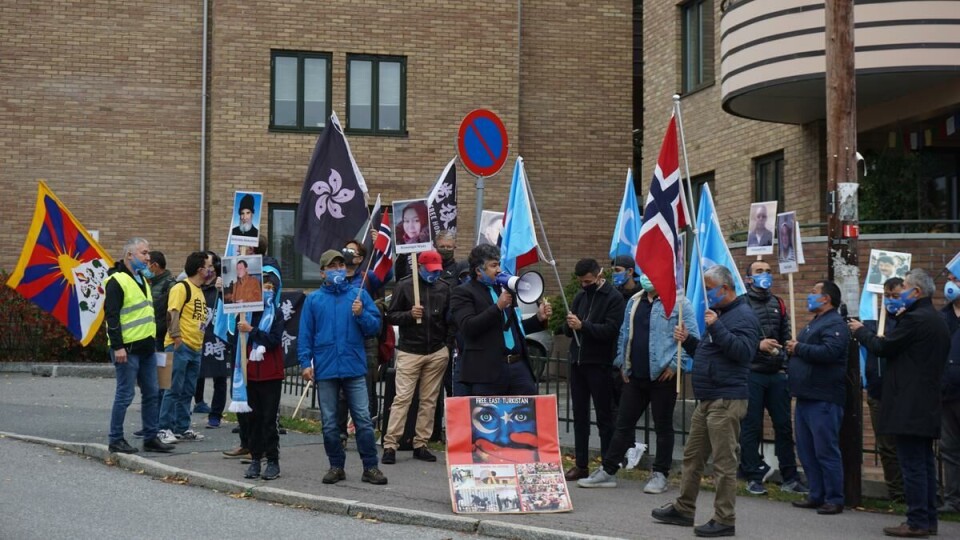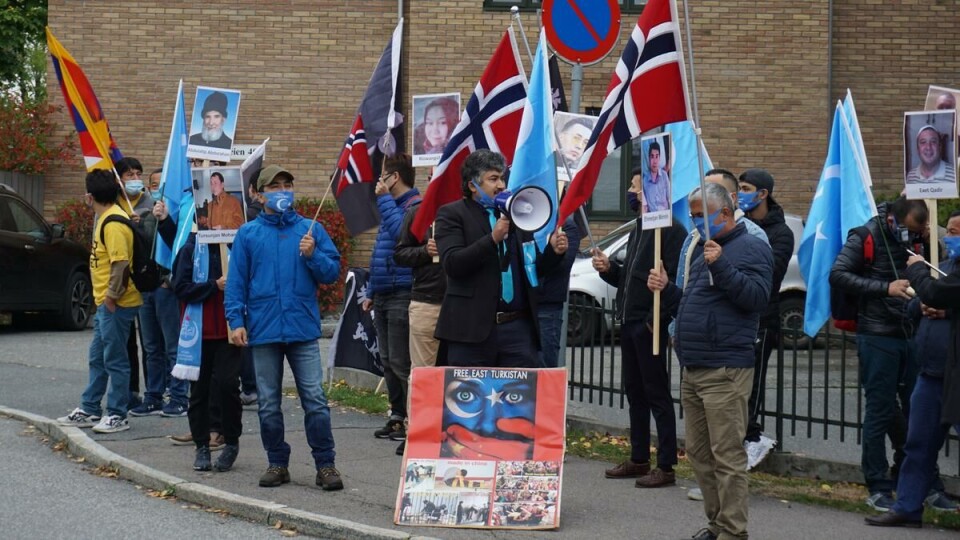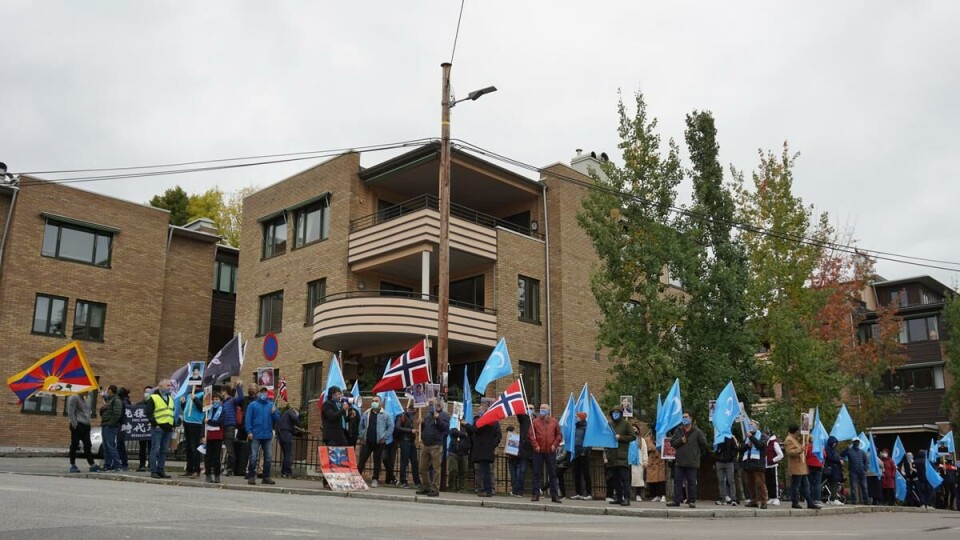Demanding Norwegian response:


Voices over genocide and restricted press freedom in China
Protesters worldwide mark the difficulties faced by Chinese students, citizens, as well as minority groups in the struggle for a free, safe, and democratic nation.
1st October is the National Day of the People’s Republic of China. This year three associations came to the Chinese Embassy in Oslo to protest against the government’s authoritarianism and human right infringements against the Uyghur minority.
The protesters claim the education camps in the Chinese province of Xinjiang are practising genocide against the muslim Uyghur minority. The province of Xinjiang is also referred to as East Turkestan by the Uyghurs.
The demonstration was hosted by the Norwegian Uyghur Committee, the Hong Kong Committee in Norway, and the Norwegian Tibet Committee. These associated regions of China are criticised for deteriorating human rights.
About fifty protesters joined the protest. Many of them are Norwegian Uyghurs. 'Fascist China', 'Close the Camps', 'Stop the Genocide, China', are the slogans shouted by the protestors.
The Norwegian Uyghur Committee demanded that the authorities at national and international level must implement strong measures in response to the specific human rights violations committed by the Chinese government.
Norwegian reactions
The committee urged Norway to implement targeted-style sanctions to Chinese bureaucrats involved in human rights violations, like the US Global Magnitsky Act. This would entail imposing financial or travelling sanctions to the responsible government figures who contributed to human rights violations.
They also demanded that the UN establishes an independent human rights mechanism to assess and monitor the serious situations in East Turkestan, Hong Kong, Tibet and Southern Mongolia.
In September, the central bank of Norway, Norges Bank, confirmed with etikk rådet that the Government Pension Fund Global was no longer investing in Hikvision. Investments were halted because the company was accused of human rights violations by offering surveillance support.
Voices of Genocide
— The last words my father told me were 'My son, don’t try to contact me anymore. Just take good care of yourself', a 33 years old Norwegian Uyghur who lived in Norway for 10 years told Inter Universitas.
The identity of Uyghur interviewees cannot be revealed as they fear the government’s repercussions. His last communication with his father who lived in China was in 2017 on WeChat, a state-censoring communication App. After that, his father’s WeChat account deleted and blocked his contact.
This Norwegian Uyghur learned from his relatives who live in Turkey that two of his uncles and his wife’s aunt were sent to the Camps.
Millions of Uyghurs were sent to the concentration camps. The conditions of these camps are very horrible. There are tortures, rapes, and killings
Semet Abla, Vice President of the Executive Committee of World Uyghur Congress
The protesting Uyghurs in Norway declare the acts of the Chinese authority are genocide.
— Millions of Uyghurs were sent to the concentration camps. The conditions of these camps are very horrible. There are tortures, rapes, and killings. Lots of crimes are committed by the Chinese Authority and the police, Semet Abla, Vice President of the Executive Committee of World Uyghur Congress said.
Abla also cited the latest report by German researcher Adrian Zenz. The report uncovered massive forced sterilization of female Uyghurs in China.

At least 16,000 mosques have been demolished or damaged by Chinese authorities in Xinjiang, according to the Australian Institute of Strategic Policies report, based on satellite images and statistical modelling.
The Norwegian government should protect the Norwegian value, support democracy and freedom, and speak up for Tibet, Uyghurs and Hong Kong issues
Semet Abla, Vice President of the Executive Committee of World Uyghur Congress
The 2010 Nobel peace prize was awarded to Chinese human rights activist Liu Xiaobo in 2010, which damaged the Norway-China relation and shrivelled Norway’s seafood export to China. The Norway-China relation normalised in 2016, but since then the Norwegian government has been very careful in criticising China, according to Alba.
- We are very upset.The Norwegian government should protect the Norwegian value, support democracy and freedom, and speak up for Tibet, Uyghurs and Hong Kong issues, Alba said.
Abolishing the security law
As demanded in the protest, the Hong Kong Committee in Norway urged the Chinese government to respect the Hong Kong Basic Law and withdraw the new Hong Kong security law. The new law has been used to punish the protesters and dissidents in Hong Kong.
The law came into effect on 30 June. It criminalises any act of secession, subversion, terrorism, and collusion with foreign forces. The law applies to any person in any place. Potentially, both Hong Kong citizens and non-Hong Kong residents could be arrested by the authorities if suspected to infringe the security law.
The deputy leader of the Hong Kong Committee in Norway (choosing to remain anonymous in the press), said that they have to seek help from the international community carefully. They try not to touch on the red line of the security law. Even so, the new law places extra worries for them to travel to Hong Kong.
— I am also worried that after the Hong Kong government arrests all the prominent political activists, they will start targeting the other foreign activists. The new security law is a bureaucratic machine which needs to keep running to justify its existence, the deputy leader said.
I am also worried that after the Hong Kong government arrests all the prominent political activists, they will start targeting the other foreign activists
Deputy leader of the Hong Kong Committee in Norway
— We still need to voice out our opinions when they see something unfair happening in Hong Kong. We don’t expect any result but maybe it can encourage the people in Hong Kong and show solidarity with them, the deputy leader continued.
Restrictions to academia and student journalists
The new security law imposes threats to academic freedom, even in the Western world. Students potentially may violate the new law by discussing content which is seen as sensitive by the Chinese government.
In light of the risks, Oxford University requested the students specialising in China to submit some papers anonymously, the Guardian reported last month. Students at Princeton University in a Chinese politics class will use codes instead of names on their work, and Harvard Business School may allow students to avoid discussing politically sensitive topics if they are worried about the risks, the Wall Street Journal reported in August.
Freedom of the press in Hong Kong is shrinking, including the room for student journalists to carry out journalism activities. In September, the Hong Kong police issued new guidelines which will only recognise government-registered and internationally renowned media, excluding student and freelance journalists, and newly-established online media. Some Hong Kong student reporters fear being silenced under the new police rules, a Hong Kong based online media Hong Kong Free Press reported last week.
— During my time there, it never seemed like there was any worry about freedom of speech or press, neither in public, nor in the school. While Hong Kong will still maintain many of its traits, it is very saddening to see how the defining principles of the region are being abolished, said Sindre Deschington, a photojournalism student at OsloMet who studied in Hong Kong for one year.
“Keeping a room for manoeuvring”
The Norwegian government is negotiating on a bilateral trade agreement with China, as confirmed by Norwegians Minister of Trade and Industry Iselin Nybø in a debate at Litteraturuset.
Arne Melsom, a Norwegian commentator and one of the board members of The Hong Kong Committee in Norway, suggested that Norway should limit its financial ties from bilateral agreements with China.
Melsom feared that Norway as a small country would not have enough negotiating power in making a trade deal with China.
— Norway could be exposed to political pressure by a giant partner who bends the rules at will and makes threats whenever it serves the purpose of its expansionist dictatorial masters, said Melsom.
The EU is on the way to the sanctions on the members of the Belarus government, as reported by the Financial times. In the future, a dilemma may arise that can give Norway a bad headache.
The day may come when the EU decides to impose sanctions on Chinese businesses and officials in response to the gross human rights violations that are taking place in China, Melsom suggested.
Keeping a room for manoeuvring away from the human rights perpetrators in Beijing by following Canada's recent decision to drop plans for a free trade agreement, is our best option
Arne Melsom, board member at Hong Kong Committee in Norway
Melsom argues, the UK is now actively considering such sanctions in response to the swiftly deteriorating situation in Hong Kong, so the EU imposing sanctions on China is not a hypothetical consideration, but a likely scenario.
— If Norway has entered into a free trade agreement with China at the time of sanctioning, what do we do? Partner up with our allies or kowtow to Beijing to protect our export industry, Melsom questioned.
— Keeping a room for manoeuvring away from the human rights perpetrators in Beijing by following Canada's recent decision to drop plans for a free trade agreement, is our best option, Melsom suggested.
































